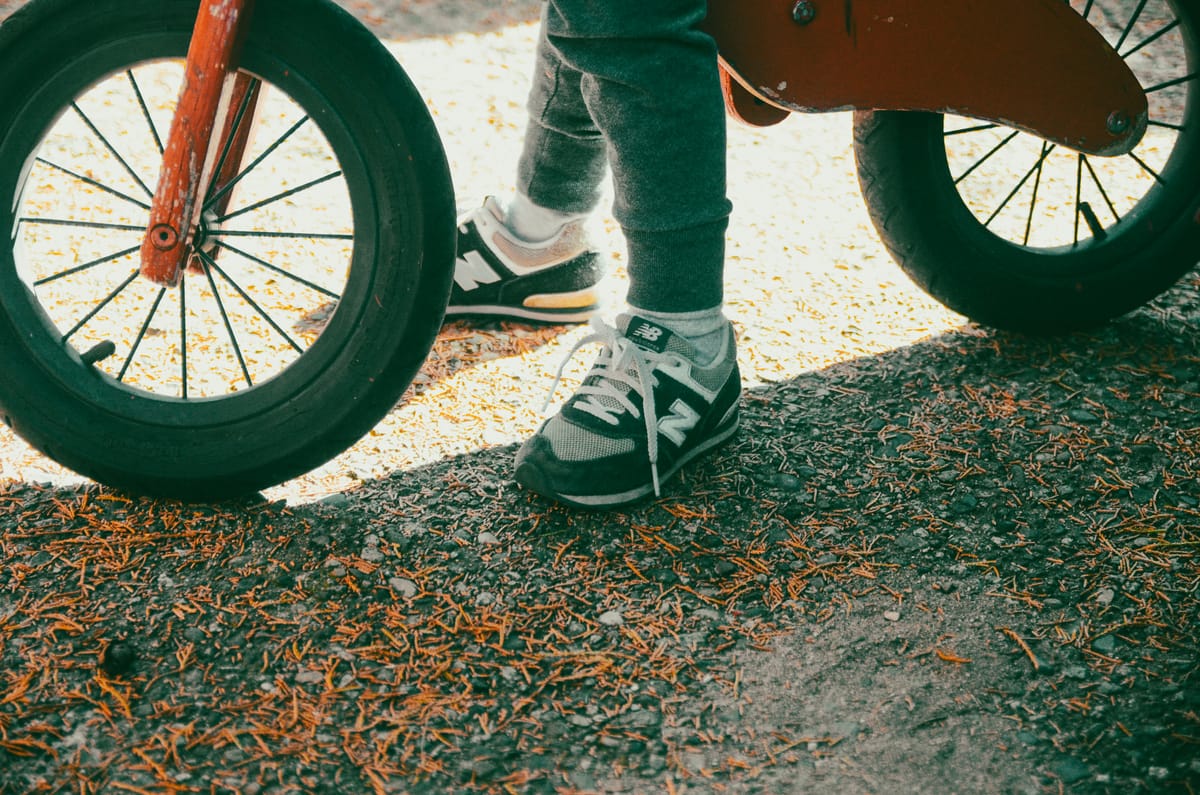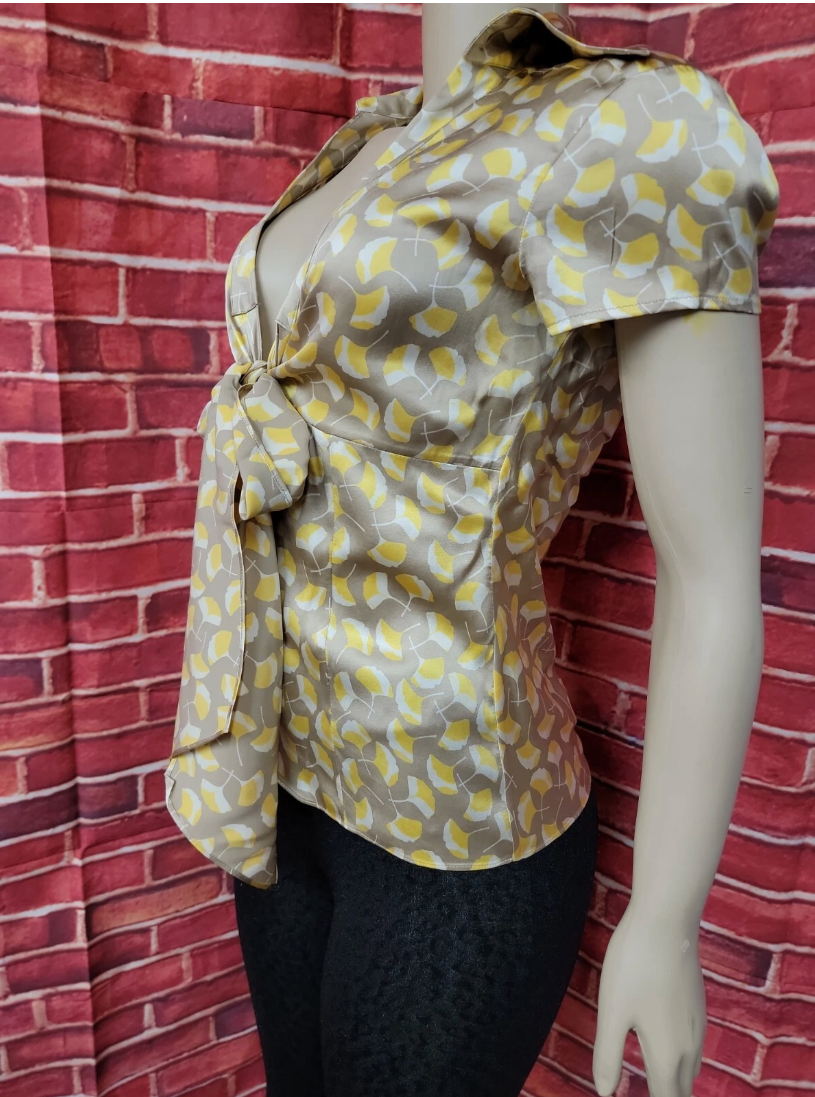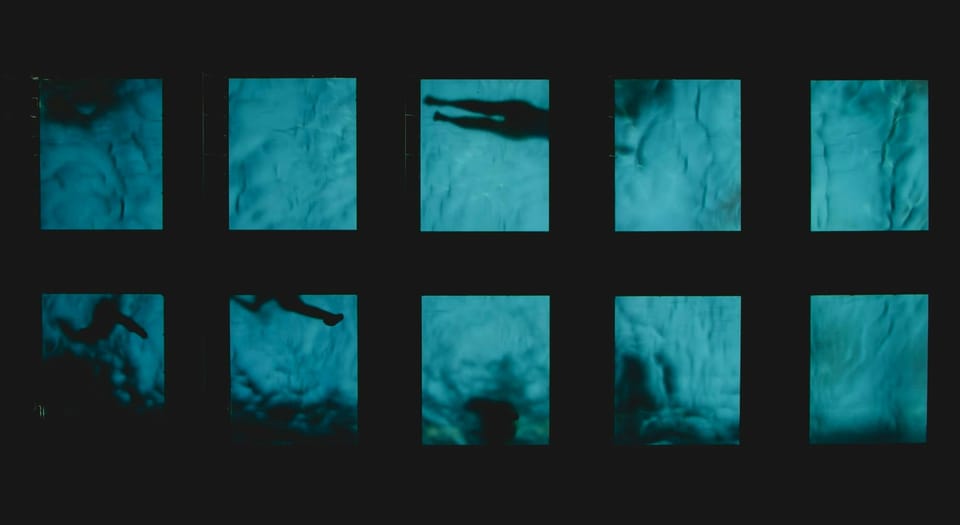The Limits of my Queerness
I knew binary gender was a myth when I was 15. You’d think l would understand my young child’s transness. But I have so much to learn

This is the first essay by guest contributor Isla Lichen, a queer parent of a young trans child. Subscribe for a weekly essay in your in-box!
As a teen, coming out as queer helped me start to untangle myself from a myriad of false gender constraints. In queerness I could live into both/and in a society of either/or: gay or straight, right or wrong, sinner or saint, us or them.
I had been a tomboy who loved building forts and climbing trees. In middle school, I recoiled at purses and the color pink but also loved short shorts and eyeliner. When my aunt said “men sweat and ladies perspire,” I knew I’d never be a lady, but I didn’t know my other options.
*
We are born out of a truth beyond binaries. We are born understanding that seemingly contradictory things can be true at the same time.
At age 3, our younger child, Orla, tells me, “I am not a boy or a girl.”
Oh! I think. I understand. They are both/and. Like me.
*
On Trump’s inauguration day, my partner and I turn off the news. It’s nightfall before we learn that he has signed 36 executive orders, one of them proclaiming there are only two biological sexes.
Biology and history tell us this has never been true.
*
Even after I come out as queer, it’s hard to stop turning my body into what I am told a teenage girl should look like. Expectations have been drilled into me.
When I stop shaving the hair in my armpits, my stepdad says, “If you don’t shave, you’re not coming to Paris.” (No armpit hair in Paris of all places?)
A friend brings clippers to my house and buzzes my hair. I love how it feels when I rub my hands over my head.
At Thanksgiving, a distant uncle—a military man with a crew cut—slaps me on the back of the head. With each slap, he says: “Never. Do. That. Again.”
I am silent. Stunned. I can’t move. My aunts pause setting the table, but say nothing.
*
Orla has been wearing dresses since preschool. In the first week of kindergarten they stop. But when we travel to Cuba that spring, they wear dresses for ten days straight. “When people misgender me in Spanish, I don’t know it’s happening,” Orla says.
*
At the high school where I teach, my students rarely misgender each other. But for the 5-year-olds in Orla’s class, getting pronouns right is harder.
Orla’s kindergarten teacher says she’s open to ideas, and I give her Neither by Airlie Anderson, a book about a land of “This and That”—of birds and bunnies, of binaries—until a little creature who is “Neither” comes along.
I ask Orla if they want me to send in more books and they shake their head. They just want the their classmates to understand.
“This isn’t just about you,” I say. “Everyone has a gender.”
“I KNOW!” Orla shouts, “but the others don’t have to tell anyone about theirs.”
*
The summer before 10th grade, my friend Adam passes me Leslie Feinberg’s novel Stone Butch Blues. Jess, the hero, lives an unconventional—to my young American self—life, outside of gender boundaries. A world opens up to me far beyond the gender norms paraded on the cover of Teen that promise must-have looks and summer weight loss hints my cousins trade at the beach.
I read about the Stonewall Rebellion. It sinks in that, as a queer person, a way has been made for me by those who came before.
I don’t yet know that I can make my own way, or how far that way might go.
*
I make a wish that someone will come into our lives whose gender expression reflects Orla’s. Days later, Tisha, a young trans woman, shows up at a potluck in our community garden.
I have the sense that we’ve been friends through many lifetimes and have found each other again. We sit beneath an apple tree pulling bindweed. Tisha mentions she is between jobs and looking for an apartment. “You can stay with us!” I say.
When Tisha moves in, Orla starts wearing dresses again. Mornings before school, Orla stands at the door to Tisha’s room twirling in a dress. Tisha throws her head back, clapping “Yes! Yes!”
*
Junior year. I learn that a girl on my lacrosse team has a crush on me. Lesbian—the word grosses me out at first because of how it sounds in other people’s mouths, like a slur.
But that summer, when Kavya and I kiss, my whole body lights up. I sit my mom down at the kitchen table and tell her, “I think I’m a lesbian,” and the word sings on my tongue.
Consider a paid subscription to support our work:
I imagine my mom’s response will involve taking me out for a celebratory slice of cake.
Instead, she tells me I’m mistaken. “You are straight,” she says. “You always have been. I see you married to a man in a house with a white picket fence.” I back into the bathroom, turn the shower on cold, step into the water in my clothes.
I never told my mother that I’d had crushes on girls for as long as I could remember. In 4th grade I loved Kitty, a wild child who’d hold my hand and jump off the top of the monkey bars. The only other girl who could push the tire swing as high and as fast as I could.
I wonder how my life would have been if, like Orla, I had claimed myself from the start.
*
Under Trump, the National Park Service erases the T from the Stonewall National Monument web site, leaving just LGB. This despite that trans women led the Stonewall rebellion.
*
Orla stomps their foot. “Kids in my class are still calling me the wrong thing!” I puzzle what to do and come across a video of Ella Jenkins singing “Who Fed the Chickens?”—a song about pronouns. At the schoolyard gate the next morning, I half-sing the opening to Orla’s teacher: “Who fed the chickens? They did. On this fi-ine day.”
Later that week she tells me the class has been singing the song every morning, that she changes the pronouns with each verse, and that the children love pointing to themselves when she gets to theirs.
*
I’m 17. The poet who runs the slam team in our city takes me under her wing. She hands me the phone book and tells me to read out some names. “Notice what happens to your voice at the end of each name. Notice your intonation,” she says.
I hear the way my voice rises, unsure.
“Is that what you want?” she asks. “To sound like you’re asking permission?” I bite my lip, near tears. “You’re how old? That’s a lot of years of social conditioning,” she says.
“Yes,” I say, “yes it is,” and my voice drops like a stone. She laughs a deep laugh, throwing her head back.
*
We are on the way home from school, kids in the backseat. My partner drives while I fill out a registration form for a sports clinic at the Boys & Girls Club for our older child, Jay. The form asks many questions, including: Is your child male or female?
I ask Orla if they want to do the clinic. “Orla,” I say, “if I fill out the form for you, do you want me to answer boy or girl?”
Orla scrunches up their nose and growls. “Anything that asks me that I won’t do,” they say and curl into a ball in their booster seat.
We pull up to the house, and I turn around in the front seat to face Orla and Jay. “There have always been more than two genders,” I tell them. “Our patriarchal society is structured to make us forget this, but we are all born with this awareness.”
My partner gives me a quizzical look. I realize what I’ve said makes no sense to the kids.
“Okay,” I say. “Remember when Mary Poppins tells the twins that their older siblings, Jane and Michael, once understood the language of starlings, and the wind, and the stars, but they've forgotten it?”
Orla and Jay nod.
“The truth is, you never forget the wisdom you are born with,” I say. “It just gets buried underneath things. Sometimes it gets buried under lies people tell.”
*
As teenager, it’s hard to stop feeling that thin is beautiful, that I need to make myself small. I stand in front of the bathroom mirror and touch the shadows between my ribs. At dinner, I pick at three of mom's tortellini, make them last half-an-hour, cutting each into tiny bits.
But when Kavya and I start dating, this shifts.
Oh, my brain clicks: I don’t have to pay attention to what boys want because I don’t want them. I have a girlfriend!
I learn to talk back to the voice in my head that is still telling me You’re ugly. “I know who you are,” I say to that voice. “I’m done listening to you.”
For a while, because Kavya is femme, I think I need to be butch—I’m still caught in the binary.
I wear cargo pants instead of tight jeans. A backward baseball cap. I take up space. I stop starving myself. Heaven is cornbread, BBQ tempeh, avocado sandwiches with sprouts, my girlfriend’s chai, and kissing her wherever.
*
My partner is on the phone with the Health Department, making tetanus shot appointments for the kids before we return to Cuba. My phone lights up with a text from a friend, “Ooo there it is. Having a trans kid is now officially child abuse.” She links to a White House memo announcing National Child Abuse Prevention Month. One of the only examples of child abuse Trump cites is “the sinister threat of gender ideology.” He promises “swift justice” to “any evildoer who threatens the health and safety of our children.”
I try to show the text to my partner before he discloses Orla’s gender to the Health Department, but it’s too late. “Yes, their name is Orla,” he’s saying. “No, they’re nonbinary.”
My palms begin to sweat. What will the administration do with a record of Orla’s gender on a government database? Could Orla be taken from us?
*
My panic continues to rise as the first weeks of the administration turn into months.
When my heart pounds, or I wake up in the middle of the night, I remind myself of the winter after college, when I worked at the Oscar Wilde Bookshop in New York’s West Village (the oldest LGBTQ bookshop on the East Coast). Some mornings I would grab a coffee, walk around the block to the Stonewall Inn, and stand there in front of the bar visualizing the Stonewall Rebellion—the bravery of drag queens throwing bricks, pennies, shot glasses. The police, weakened, barricading themselves in the bar, trapping themselves in the very space they were trying to empty.
I remind myself of our queer elders who refused, and still refuse, to stop dancing despite the danger of raids and laws laid down against their bodies. Our queer ancestors who refused to relinquish their lives to fear, who kept their minds free, who came before us, who love us, who are rooting for us.
Who are family.
*
The administration erases more letters from the Stonewall Monument. The B is almost completely gone now from the web site.
But we were always here. We will always be here.
The president and his administration are unable to imagine not only us but also themselves.
We have, all of us, always been here.
*
And yet. Despite having, for decades, attuned myself to the radical politics of my queer elders, and to the nuances of gender in my own body and the bodies of people I have loved, I was unprepared when my own child explained their gender to me.
They used the simplest terms. The terms of a three year old. Orla said, “I’m not a boy or a girl.”
I thought they were saying, “I’m both/and.” Which is to say, I’m like you.
But I was wrong.
Orla was saying, “I’m neither.”
Neither, as in: I am beyond anything you have imagined.
*
Isla Lichen is at work on When Leaving Home, a book about life under the current U.S. administration as the parent of a trans child, which explores questions of immigration, including their great-grandfather’s flight from Germany after he “brushed shoulders with Hitler” in WWI.



